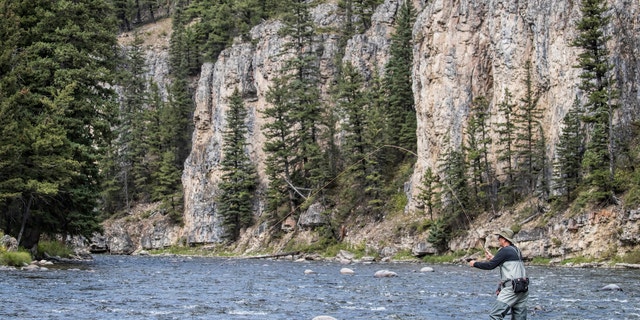
Will Cain: Climate change wackos just won’t stop
‘The Five’ co-hosts weigh in on Nora Swisher, the spokeswoman for a group of protestors who shut down a Washington, D.C., highway, admitting that the movement’s disruptive protests are aimed at ‘disrupting people’s lives.’
The Biden administration is under fire for regulatory proposals critics have warned could serve as a backdoor attack on hunting and could lead to more aggressive measures targeting hunting.
According to experts and hunting industry officials, the U.S. Fish and Wildlife Service (FWS) is expected to publish draft hunting guidelines that would substantially curb the type of equipment sportsmen are allowed to use on federal refuge properties. The guidelines are, among other provisions, expected to expand the refuge area where cost-effective lead ammunition and fishing tackle will be banned.
“Raising the cost of hunting, raising the cost of fishing and raising the cost of our crowd doing their thing is objective number one, without a doubt, because they know if you make it more expensive, less people will do it,” Todd Adkins, the vice president of government affairs for the Sportsmen’s Alliance, a pro-hunting group, told Fox News Digital in an interview.
“When it comes to the FWS issuing a ban on various refuges as they expand hunting opportunities — that’s all we’re really asking,” Adkins continued. “Number one, are you finding specific problems related to lead exposure at specific national wildlife refuges? And number two, have you evaluated the consequences that this ban will have on the users, both hunters and anglers?”
SENATE DEMS LINE UP IN FAVOR OF SPIKING BIDEN’S CHINESE SOLAR HANDOUT

President Joe Biden delivers remarks in Hagerstown, Maryland, on Oct. 7, 2022. (AP Photo/Manuel Balce Ceneta)
In 2021, the Center for Biological Diversity — an influential environmental group with assets exceeding $40 million that advocates for stringent federal wildlife protections — sued the federal government over a Trump administration rule expanding hunting and fishing on 2.3 million acres across 147 wildlife refuges and national fish hatcheries.
Instead of defending the rule, the Biden administration asked the court to delay proceedings in the case in February 2022, and in November agreed to a settlement with the Center for Biological Diversity that stipulated the government would take wide-ranging steps to protect wildlife “harmed by expanded hunting and fishing” on national wildlife refuges.
Under the settlement, the FWS promised to expand lead ammunition prohibitions across various refuges beginning in 2026 as part of the 2023-2024 annual rule expected to be proposed in May. The 2022-2023 rule finalized in September had only banned lead ammunition throughout the Patoka National Wildlife Refuge in southern Indiana.
“Every year, there’s a hunt and fish rule that comes out at the end of the season,” Benjamin Cassidy, the director of government affairs for the pro-hunting Safari Club International and a former senior Interior Department official, told Fox News Digital. “When I was in the [Trump] administration, these were big packages to celebrate opening of access, expanding opportunities for access.”
“Since this administration’s been in, the numbers have shrunk every year to lower numbers. It’s really just kind of been masking tape over what’s really been bans,” Cassidy continued. “We’ve seen millions of acres closed and we’ve seen lead bans being put in place.”

Fish and Wildlife Service Director Martha Williams was sworn in to lead the agency in March 2022. (U.S. Fish and Wildlife Service)
Cassidy noted that as recently as Friday morning, the Biden administration announced in federal filings its intention to prohibit recreational shooting on approximately 94,900 acres of lands managed by the Department of Agriculture’s Forest Service.
Additionally, under the November settlement with the Center for Biological Diversity, the FWS agreed to respond to the group’s petition demanding a lead ammunition phaseout across all national wildlife refuges. The settlement even required the agency to tell hunters to use bear spray when attacked by a grizzly bear instead of shooting the endangered animal.
And in a February filing, the FWS said it would study whether delisting grizzly bear species under the Endangered Species Act was warranted, but noted such an action “is of concern and will require careful consideration.” The state governments of Montana and Wyoming have asked the agency to remove federal protections on grizzly bears to allow residents to defend their property from the predator.
“In Montana, hunting and fishing and public access is a priority. And those activities that infringe on that, that aren’t based on science, that aren’t based on management, but are based on an agenda — you know, we’re going to fight against,” Rep. Ryan Zinke, R-Mont., who served as interior secretary between 2017-2019 during the Trump administration, told Fox News Digital in an interview.
“In conservation, the very essence of Teddy Roosevelt was multiple use, public access, the best science, greater good, longest term,” he continued. “That’s the American conservation ethic, which largely stems from Roosevelt and Pinchot and managing our forests. Hunting was core to that.”

One of Rep. Ryan Zinke’s, R-Mont., first actions when he served as interior secretary under the Trump administration was to allow lead ammunition on federal wildlife refuge properties. (William Campbell/Getty Images)
Zinke added that one of his first actions leading the Interior Department was to expand hunting opportunities and reverse Obama-era restrictions on lead ammunition usage across wildlife refuges.
Environmental groups like the Center for Biological Diversity and Defenders of Wildlife criticized the move at the time, arguing lead ammunition poisons bald and golden eagles while risking contamination of waterways and drinking water. But hunting groups have argued that there is no science to support such claims.
BILLIONAIRE-FUNDED ECO GROUP QUIETLY TAKING FARMLAND OUT OF PRODUCTION IN RURAL AMERICA
“This is a state issue. It should not be agenda based, it should be based on science. The state fish and wildlife experts evaluated within their respective boundaries and borders,” Zinke said. “If the environmentalists really wanted to get concerned about the bird population, maybe they should look at the 750,000 plus birds that are chopped up by wind and increasing.”
“This is not about lead ammunition. This is about steps to reduce access to hunting. Their record is clear,” he told Fox News Digital. “What we face a lot of times with this administration is overreach.”

An angler is pictured on the Gallatin River in Bozeman, Montana. (David E. Klutho /Sports Illustrated/Getty Images)
In addition, led by Sen. Steve Daines, R-Mont., 27 Republican senators wrote to FWS Director Martha Williams in May 2022, asking her not to restrict lead ammunition on wildlife refuges.
And earlier this month, Daines and 22 fellow senators introduced legislation that would prevent the FWS, Forest Service and Bureau of Land Management (BLM) from banning lead ammunition or tackle unless such an action is supported by the best available science.
“This could extend beyond just the National Wildlife Refuge System under Fish and Wildlife Service,” said Gabriella Hoffman, a senior fellow at the Independent Women’s Forum’s Center for Energy and Conservation.
“I worry it could extend to BLM,” she told Fox News Digital. “Once they’re given a taste of bans, they’re going to try to pursue it elsewhere because, again, they view hunters as an obstacle, even though hunters are largely the primary drivers of conservation.”
The FWS didn’t respond to a request for comment.






